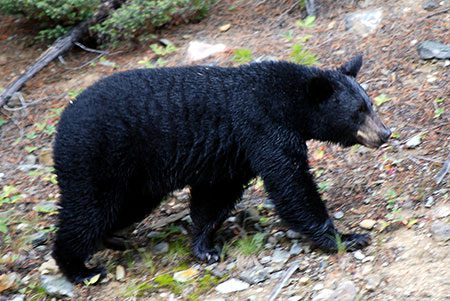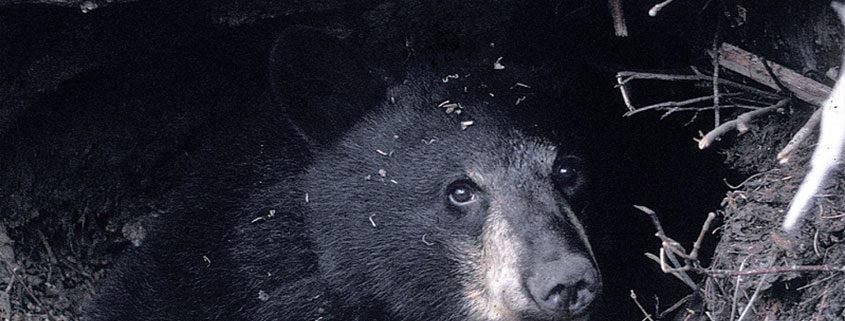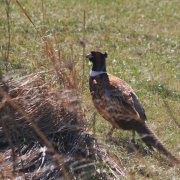The Miracles of Black Bear Hibernation
As the weather turns colder and daylight hours decrease, many of us appreciate the cozy comfort of our homes. Hot chocolate becomes a staple in your diet, and your mouth begins watering for all of the tasty holiday foods. Some of us begin dreading that winter weight gain that comes along with decreased activity and heightened appetites. Oh, but if we were black bears…
Wisconsin Black Bears in the Fall
 Black bears actually go through 5 stages of activity levels throughout the year – hibernation, walking hibernation, normal activity, hyperphagia, and fall transition. During fall transition, much like fish and other animals, the bears eat excessively to bulk up for the coming winter. At the end of this period, they actually stop eating, even before hibernation begins, and focus on drinking liquids to expel waste. They begin sleeping more and more, sometimes only awakening and moving around for 3-4 hours a day.
Black bears actually go through 5 stages of activity levels throughout the year – hibernation, walking hibernation, normal activity, hyperphagia, and fall transition. During fall transition, much like fish and other animals, the bears eat excessively to bulk up for the coming winter. At the end of this period, they actually stop eating, even before hibernation begins, and focus on drinking liquids to expel waste. They begin sleeping more and more, sometimes only awakening and moving around for 3-4 hours a day.
Actual hibernation periods can vary greatly, depending on the weather and region where the black bear lives. In Wisconsin, hibernation can begin as early as September and last through April. The preparation, though, begins in the summer months when the bear chooses a spot and begins digging a den. But black bears tend to wait for one of those Wisconsin size snowstorms to actually retreat to their sanctuary.
Black Bears in the Winter
As the bear retreats to its den, it begins to enter a period of deep sleep. The heart rate, body temperatures, respiration levels and metabolic rate all begin to slow. Did you know a hibernating bear only breathes once every 45 seconds? The body temperature goes down by about 10 degrees, which is significantly less than that of other hibernating mammals. Another difference for black bears is that they CAN be awakened fairly easily during their deep sleep – hence the saying “don’t poke a sleeping bear!” At 400 pounds, a Wisconsin black bear is not a creature you want to bother!
Another interesting fact about black bears during the winter is the birth of their cubs. Female black bears can actually delay implantation until late fall to determine if she has enough fat reserves to successfully birth and nurse her young. The actual birth takes place in the den, typically in January. As the mother slumbers, the little cubs nurse and grow quickly beside her, ready to leave the den with her in the spring.
Hibernation Cures for Humans
Black bears get to enjoy all the comfort of holing up for the winter, but unlike humans, they don’t have the added pounds to show for it come spring. In fact, despite the fact that black bears do not eat for long periods of time, they emerge in the spring healthy and healed from their rest. Now, if you were to eat very little all winter to scare off those few pounds, your muscle mass would be deteriorated and you would be starving. And likely pretty grumpy!
The hibernation of black bears is quite interesting, and has even proven potentially useful to the health of humans. Their metabolic changes during the winter months of these majestic creatures have been popping up in health and science studies for the last few decades, trying to uncover the mysteries that could benefit human health. It’s believed this could be beneficial in several areas of health problems, including:
- Bone growth and healing
- Preventing osteoporosis
- Reducing cholesterol buildup
- Utilizing/storing key nutrients
- Maintaining physical health during comas
The applications that nature presents for human health are fascinating! We have long relied on medicines and cures from the world’s plant and animal life, and the possibilities continue to expand every year.
Next time you chance upon a lumbering black bear, or are enjoying the beauty of the forest foliage, think about the miracles that nature presents, the intertwining threads connecting man to wilderness, the sheer bigness of the world in all of its magic. Because simply by taking a moment to breathe in that beauty, you have begun a wonderful journey! And the next time you are sipping a delicious steaming cup of hot cocoa, make a toast to the sleeping black bear that is dreaming of such a treat!
Connect with Nature at The Wilderness Reserve of Wisconsin!
Forming a lifelong connection with nature can be one of the most rewarding journeys of your life. Introducing a child to that wonder and awe is even more satisfying. By planning a family vacation to The Wilderness Reserve, you can experience Wisconsin wilderness up close and personal! Enjoy your choice of outdoor activities on this 5,500 acre reserve, where the trees stand tall and the views can take your breath away. Can you imagine a better setting for a Wisconsin family vacation? We can’t!






